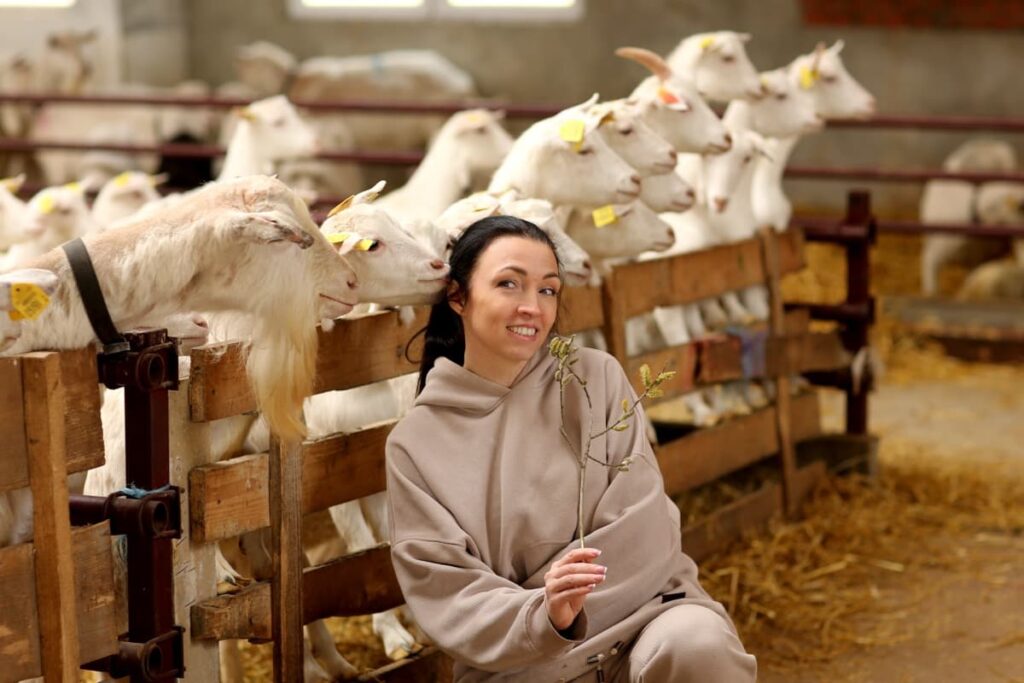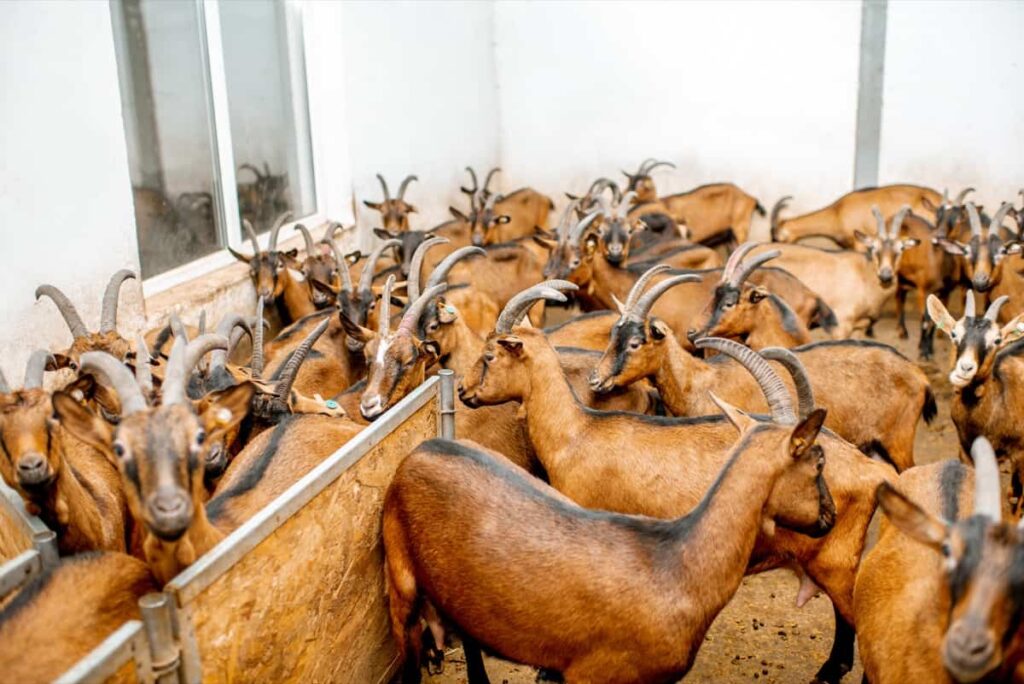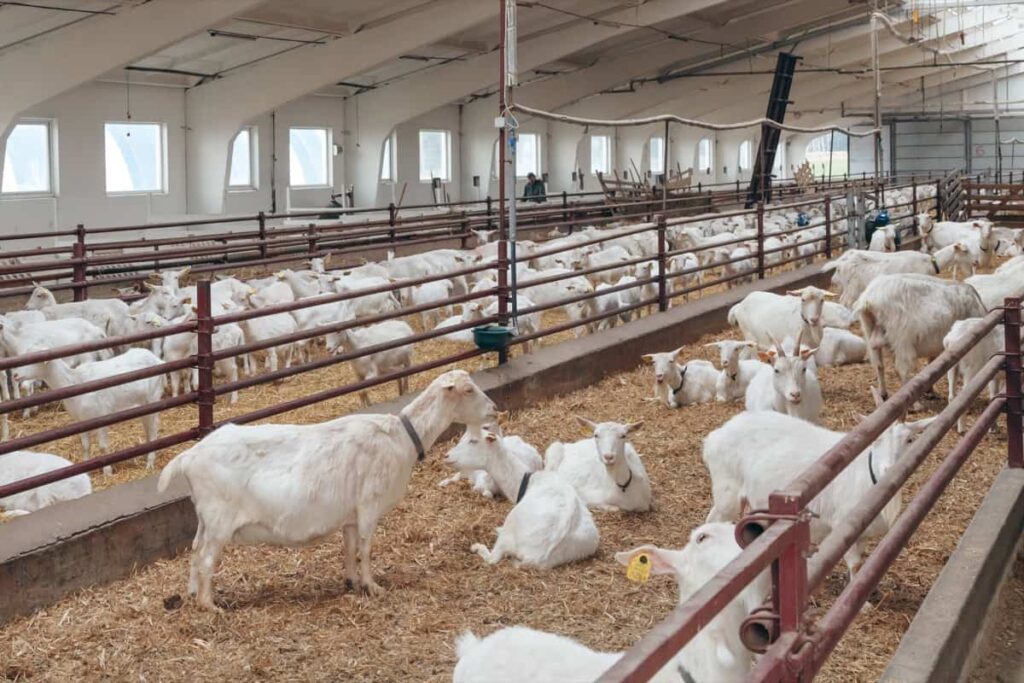Commercial goat farming refers to the process of raising goats for commercial purposes. This is mainly done for milk, meat, and wool production. The demand for goat products has grown rapidly due to their health benefits. With increasing demand for meat, milk, and wool products, raising goats has become an attractive option for farmers worldwide.

Commercial Goat Farming Information Guide
What is Commercial Goat Farming?
Commercial goat farming involves raising goats for commercial purposes, including meat, milk, and wool production. Farmers rear goats under intensive or semi-intensive systems in commercial goat farming to ensure maximum productivity and profitability. They provide good housing facilities that protect the goats from harsh weather conditions and predators.
What Equipment is Needed for Commercial Goat Farming?
- Good Shelter: A well-constructed shelter is needed to protect your goats from harsh weather conditions such as extreme heat or cold. The goat shed must be designed in such a way that it provides enough ventilation and light.
- Feeding Equipment: Your goats need feeding troughs, hay racks, and water containers. These must be kept clean from contamination to avoid health issues.
- Fencing Materials: Goats can easily escape if they find any weakness in their fencing system, so strong fencing materials are required to keep them within their enclosure.
- Milking Equipment: If you plan on milking your goats for dairy production purposes, you’ll need a machine or hand-operated pumps.
- Cleaning Tools: You’ll require cleaning tools like brushes, rakes, and shovels to keep the barn clean.
Good Housing for Increasing Goat Farming Productivity
Good housing ensures the well-being and productivity of your goats, as it protects them from weather conditions and other harmful elements. The type of housing required for your goat farm will depend on the number of goats you have, the climate, and the available space.
Veterinary Services for Goats to Promote Healthy Growth
- Veterinary services for goats may include vaccinations, deworming, and treatment of common illnesses such as pneumonia or mastitis. In addition to preventive care, it is also important to have access to emergency veterinary services in case of unexpected injuries or illnesses.
- Proper nutrition and housing are key components of goat health, but even with the best management practices, there may still be cases where medical intervention is necessary. Working closely with a knowledgeable veterinarian can help ensure that your goats receive prompt and effective treatment when needed.
Goat Farming Management Practices
- One important aspect of goat farming management is providing proper nutrition. Goats need a balanced diet, protein sources such as soybean meal or fishmeal, minerals, and vitamins.
- Another important practice is ensuring good hygiene in the barns and pastures where goats live. Clean water should always be available, along with regularly cleaning their housing spaces.
- In addition to feeding and cleaning practices, keeping up with veterinary care for your goats is essential. This means scheduling regular check-ups and vaccinations to protect against common diseases.
- It’s also important to monitor herd health regularly by observing animal behavior patterns, which can signify an illness in one of the animals.
- Record-keeping is crucial for monitoring productivity levels within your herd over time so you can make informed decisions about breeding programs and culling less-productive animals if necessary.
In case you missed it: Goat Breeding and Genetics for Improved Productivity and Disease Resistance

What Breeds of Goats are Best for Commercial Goat Farming?
- Boer goats are popular worldwide due to their rapid growth rate and high-quality meat production.
- Malwa goats are known for their excellent milk production. They also have good resistance to diseases and adapt quickly to new environments.
- Tellicherry goats are native to India and produce quality meat with low-fat content. They can thrive in hot climates with minimal care requirements.
- Black Bengal goats are highly adaptable and can survive on low-quality feed if they can access clean water.
- Jamunapari goats originated from India but are now being reared worldwide because of their high milk yield potential under optimal conditions.
- Sirohi goats’ hardy nature makes them great survivors in harsh weather conditions, particularly in hot regions where other animals would struggle.
- Barbari Goats display remarkable fertility rates & quick weight gain traits, making ideal choices for intensive fattening systems focused on producing quality meats within short periods.
- Beetal Goats bred offer several advantages, such as quick maturation time, large frame sizes suitable for milking/meat productions for milk yields.
Nutrition and Feeding Tips for Healthy Goats
The diet should be well-balanced and provide all the nutrients for the goats to grow healthy and reach their maximum potential. Goats are browsers and this means they prefer eating leaves, twigs, shrubs, and woody plants. A good pasture with a variety of vegetation is ideal for grazing goats. However, not all pastures can provide adequate food sources, especially if you have more than 15-20 animals per hectare. Supplementing their diet with hay or silage helps ensure that they receive enough nutrition.
Commercial goat farming also involves providing additional feed in the form of concentrates or pellets containing protein, carbohydrates, vitamins, and minerals; these feeds come in different formulations depending on life stages: growth (kid), lactation (milking does) as well as a maintenance ration for adults at rest period. Water is essential in digestion, metabolism regulation, and body temperature control. Maintaining your goats’ health is an important aspect of commercial goat farming.
Health Care Tips for Commercial Goat Farming
- Regular Check-Ups: Schedule regular check-ups with a veterinarian to ensure your goats are healthy and free from diseases or infections.
- Vaccinations: Ensure all your goats receive appropriate vaccinations on time. This will help prevent common illnesses such as pneumonia, foot rot, and tetanus.
- Clean Water Supply: Always provide clean water to your goats. The quality of water can have a direct impact on their overall health.
- Clean Environment: Keep their living quarters clean and well-maintained to reduce the risk of disease transmission.
- Proper Feeding Practices: Feed them a balanced diet of protein, vitamins, minerals, and fiber according to age and weight requirements.
- Parasite Control: Implement an effective parasite control program by deworming them regularly to avoid parasitic infestations.
In case you missed it: Best Practices for Disease Prevention and Management in Goats: Strategies for Maintaining a Healthy Herd

Conclusion
Commercial goat farming is a lucrative business that has gained popularity. With proper management practices such as good housing, veterinary services, and scientific feeding practices, farmers can achieve success in this venture. However, selecting the right breed of goats and choosing appropriate raising systems, like intensive or semi-intensive ones, to maximize profits is essential.
- Types of Grass Growing for Goat Farm
- How to Train Goats for Milking: A Beginners Guide
- Goat Milking Practices and Equipment: A Beginner’s Guide
- Goat Farming for Fiber: Producing Mohair and Cashmere
- Maximizing Goat Milk Production: Tips for Dairy Goat Farmers
- Goat Farming as a Family Business: Strategies for Success
- Profitable Kenya Goat Breeds for Commercial Dairy and Meat Business
- Unlock the Secrets of Oberhasli Goat: Discover Raising and Management Practices
- Ultimate Guide to Myotonic Goats: Explore Profile to Raising